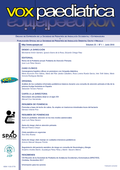![]()
Controversias del tratamiento con biológicos en la enfermedad inflamatoria intestinal
En las últimas décadas ha habido un aumento en el uso de fármacos biológicos por los gastroenterólogos pediátricos debido a un aumento de la incidencia de la enfermedad inflamatoria intestinal (EII), un mayor conocimiento de su historia natural así como de las propiedades y efectos secundarios de estos fármacos.
Los objetivos del tratamiento en la enfermedad inflamatoria intestinal han cambiado a lo largo del tiempo. Si bien clásicamente se buscaba la remisión clínica y la recuperación del crecimiento, en la actualidad se aboga por la curación mucosa ya que puede ser la única forma de modificar la historia natural de la enfermedad y prevenir las complicaciones. Los únicos fármacos que hasta la fecha han demostrado poder conseguirlo son los fármacos anti factor de necrosis tumoral (antiTNF). Sin embargo no todos los pacientes los requieren para el control de la enfermedad.
Hemos realizado un estudio descriptivo de los pacientes pediátricos con EII en tratamiento con antiTNF en nuestro hospital para evaluar su eficacia y posibles efectos adversos. Los fármacos biológicos son los únicos que han demostrado eficacia para la curación mucosa a largo plazo en la EII pediátrica. Aunque en nuestra serie la eficacia ha sido elevada con escasos efectos adversos, precisamos de un seguimiento a más largo plazo para evaluar si realmente existe un cambio en la historia natural de la enfermedad de nuestros pacientes y qué hacer en caso de pérdida de respuesta a los antiTNF.
In recent decades there has been an increase in the use of biological drugs by pediatric gastroenterologists due to an increased incidence of inflamdematory bowel disease (IBD), a better understanding of their natural history and the properties and side effects of these drugs.
The goals of treatment in IBD have changed over time. Although clinical remission and recovery of growth were classical goals, mucosal healing is now advocated as it may be the only way to modify the natural history of the disease and prevent complications. The only drugs that have been shown to be able to do so up to now are anti-tumor necrosis factor (anti-TNF) drugs. However, they are not required by all patients to control the disease.
We have carried out a descriptive study of pediatric patients with IBD treated with anti-TNF in our hospital to evaluate its efficacy and possible adverse effects. Biological drugs are the only ones that have shown efficacy for long-term mucosal healing in pediatric IBD. Although efficacy in our series has been high with few adverse effects, we need a longer follow-up to assess whether there is really a change in the natural history of the disease in our patients and what to do in case of lack of response to these drugs.
| Adjunto | Tamaño |
|---|---|
| vp_26_1_13.pdf | 143.71 KB |



